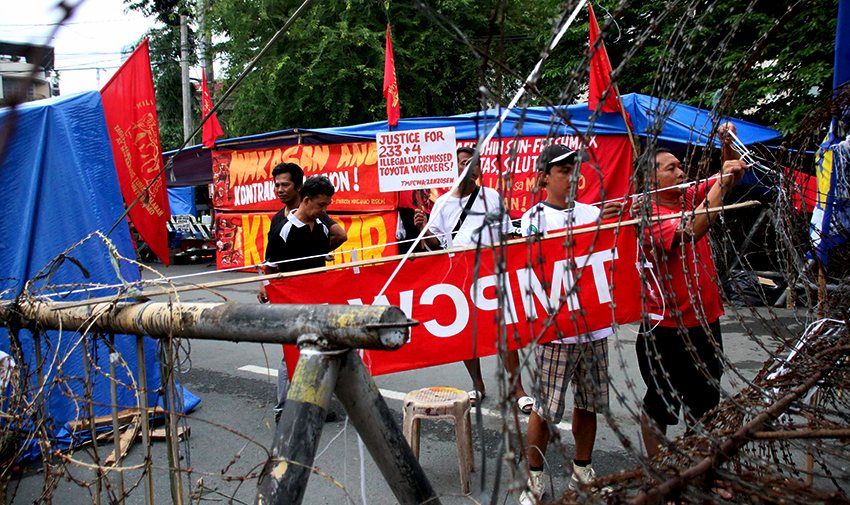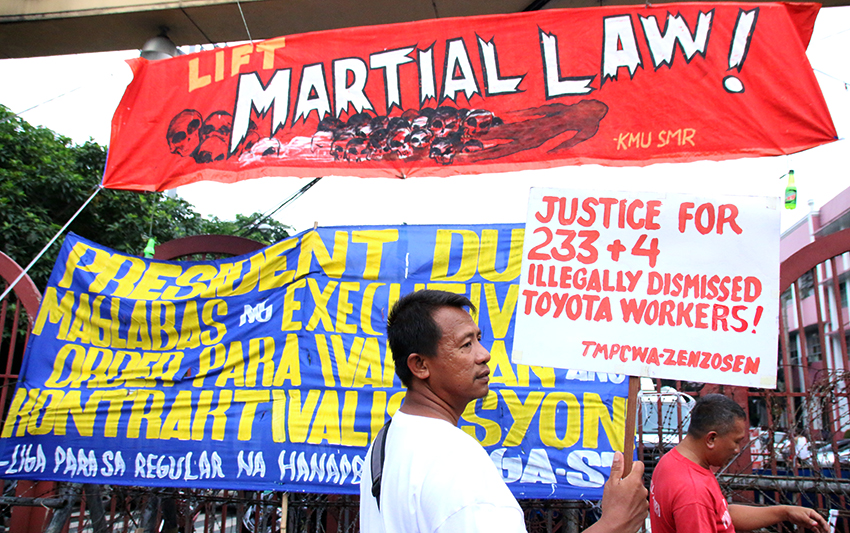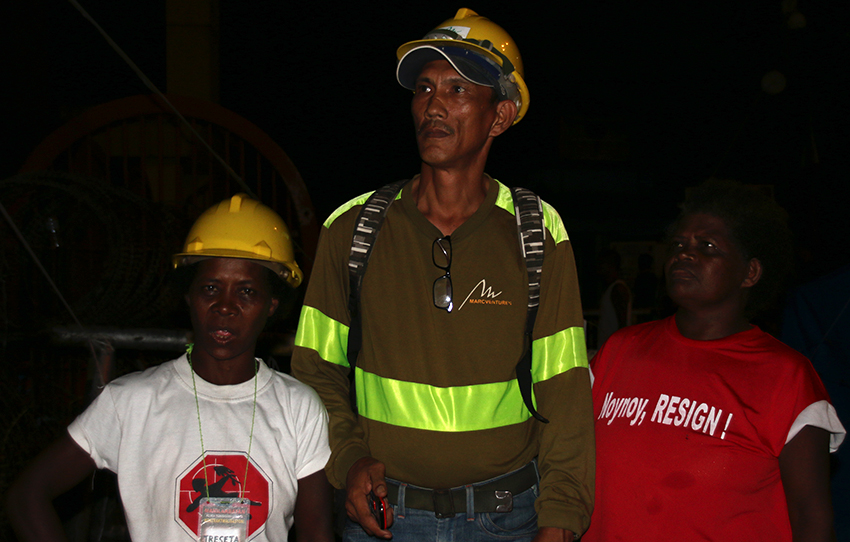
OUT FROM WORKPLACES. Workers from Southern Mindana, CARAGA Region (Region XIII), Southern Tagalog and National Capital Region come out from their workplaces and hit the streets of Manila for “Kampuhan” or campout, a protest activity ahead of the second SONA of President Duterte. (Alex D. Lopez/davaotoday.com)
MANILA, Philippines – More than 300 workers from Southern Tagalog, National Capital Region, Southern Mindanao Region and CARAGA (Region XIII) in Mindanao converged in a camp-out at the historic Mendiola Bridge in Manila.
The activity, dubbed as “Kampuhan Kontra Kontraktwalisasyon” was carried out by workers weeks before President Rodrigo Duterte will deliver his second State of the Nation Address.
For more than a week now, they braved the busy streets of Manila to bring their concerns right at the doorsteps of national government agencies and officials.
“President Rodrigo Duterte’s promise of ‘change’ has not come in his first year in power,” the labor group Kilusang Mayo Uno said in a statement earlier this month, emphasizing that the present administration “has shown extremely low productivity in terms of addressing our workers’ legitimate and just demands and even failed in delivering his own promises and pronouncements.”
Contractualization continues to be the practice of most of the companies owned by capitalists in the country and the cases of the dismissal of workers continue to mount.
Treseta Dilamente, a member of Mamanwa tribe in Claver, Surigao del Norte is among the hundreds of workers who joined the “Kampuhan”.
She worked as a sweeper at the ADNAMA Mining Resources Inc. or AMRI but recently she was dismissed as her contract was no longer renewed.
Dilamente said the mining company failed to fulfill its promise to provide jobs for the Mamanwa tribe that own the ancestral land where the company operates.
“When they were asking for our signatures to allow them to mine our ancestral land they told us we will be given jobs. We agreed because we badly need jobs for earnings,” she added.
She was surprised when the company refused to renew her contract and was told that another person will take her place.

Image by Mara S. Genotiva / davaotoday.com
Contractualization continues
When Duterte campaigned for the presidency last year, he captured the attention of the millions of labor force in the country when he promised to end contractualization.
Contractualization shackles most of the labor force in the Philippines to develop and improve their living conditions as the scheme violates their right to be secured in their work.
KMU said Duterte’s promise of ending contractualization remains unfulfilled as the group summed-up his first year into office as “a year of worsening hunger, poverty and injustice among Filipino workers and people under the continued implementation neoliberal economic policies of promoting cheap, flexible and repressed labor.”
Department of Labor and Employment Secretary Silvestre Bello III also admitted the agency failed to regularize the thousands of workers in the country.
“We failed to regularize the contractual as much as we wanted to. We have a work force of about 40 million employees,” said Bello in a press briefing in Malacañang last July 4.
Among the main reasons for such failure to regularize the workers is the limited number of Labor Law Compliance Officers of DOLE.
“Ngayon, while we wanted to regularize all our employees under laws on contractualization, medyo nahirapan kami dahil unang-una we are supervising almost 900,000 business establishment throughout the country and I am very sorry to tell you that we only have a little over 500 Labor Law Compliance Officers, inspectors for short,” he said.
But he added that such situation is not an excuse for the DOLE, Bello emphasized, as he reported that the agency has already made a request to President Duterte for additional inspectors.
“Luckily he agreed to give us 200 additional inspectors; but definitely again, kulang pa rin iyan. We need to be able to effectively inspect all these business establishments we need at least additional 2,500 inspectors,” he said.
Bello added that DOLE requested the labor unions and employers’ organizations in the country to nominate people from their ranks to be trained as the agency’s inspectors.
So far, he said, the employers nominated five while the labor unions submitted around 50 individuals to undergo a 10-day training to be deputized and utilized by the DOLE.
Despite the real score that contractualization actually happens in workplaces, Bello claimed that such scheme is already a thing of the past.
He said management and employers now realize that contractualization is unlawful – “wala na
‘yan, bawal na yan,” he told reporters last July 4.
Bello said he issued Department Order No. 174 Series of 2017 anchored on the framework that contractualization is prohibited but with the exception.
“Mayroong exception siyempre. In anything, in life, there’s always an exception,” he pointed out.
Among the exceptions is on outsourcing, such as in the case of hiring security guards, one has to outsource from security agencies.
Janitorial jobs and project-based workers or employees can also be outsourced, Bello said.
But for KMU, the EO 174 it issued by DOLE only legitimized the contracting-out of labor through the contracting agencies.
“The DOLE’s much-hyped efforts that claimed to have regularized 70,000 workers remain questionable,” the KMU said, arguing that regularization through labor contractors and not through their principal employer is not regularization.
“The DOLE has also failed to act on the obviously undeniable practice of ‘Endo’ against SM workers and the prevalent contractualization by big multi-national corporations especially in Special Economic Zones,” it added.

JOBLESS FOR 7 YEARS. Rogelio Magistrado, Jr., is among the 233 workers of Toyota Philippines in Sta. Rosa, Laguna who were dismissed from work in 2010, after the DOLE certified their union as the sole and bargaining agent when they won in a certification election. (Alex D. Lopez/davaotoday.com)
Rogelio Magistrado, Jr., is among the 233 workers of Toyota Philippines in Sta. Rosa, Laguna who was dismissed from work in 2010.
Magistrado said Toyota is among the big companies inside the Special Economic Zone in Laguna that continue to practice contracting of workers.
“Ang Toyota ay matatagpuan sa Sta. Rosa na isa nang special economic zone. Ito po ay may tax holiday at nagtatamasa ng ibat-ibang pakinabang mula sa ating pamahalaan na ang kapalit ay ang patuloy na pagbabarat ng sahod ng mga manggagawa,” Magistrado said.
The workers that Toyota hired after they were dismissed were all contractual, he added, some were taken in through agencies while others through cooperatives.
Magistrado said they were fired after the DOLE certified their union as the sole and bargaining agent when they won in a certification election.
“Kinabukasan po ng paglabas ng resulta (of certification election) ay hindi na po kami pinapasok ng Kapitalistang Toyota,” he pointed out.
Most of the 233 workers kicked out were also accused of trumped-up criminal cases, he added.
“Karamihan po sa aming mga miembro ay kinasuhan ng mga gawa-gawang kasong criminal na naging dahilan na nahirapan kaming makahanap ng trabaho dahil hindi po makakuha ng NBI (National Bureau of Investigation) at police clearances,” Magistrado said.
In Davao Region, 54 workers from Korean-owned Shin Sun Tropical Fruit Corp. in the province of Compostela Valley were also dismissed in March this year.
They also joined the “Kampuhan” in Mendiola in solidarity with the other workers in the country to bring to the attention of the national leaders the continuing plight of workers.
“We want to dialogue face-to-face with President Duterte,” said Jerome Hatamosa, the spokesperson of dismissed Shin Sun workers.
ML taking its toll on workers
The workers’ “Kampuhan” is also calling on President Duterte to lift the imposition of martial law and the suspension of the privilege of the writ of habeas corpus in Mindanao.
KMU said martial law is now taking its toll on workers as capitalists and big businesses conspire with state forces to curtail civil liberties and suppress the legitimate and just demands of workers.
Workers of Shin Sun who were on strike against the contractualization and union busting were violently dispersed lastJune 2.
KMU also cited the cases of union busting at the Manila Cordage Company-Manco Synthetics Inc. (MCC-MSI) and Philippine Dong Yun Plate Making Corporation in Laguna, Soro-Soro Ibaba Development Cooperative (SIDC) in Batangas and Freshmax Trading Company in Compostela Valley.
President Duterte is recommending for the extension of martial law until the end of this year.

LEGITIMATE DEMANDS. Aside from the call to end contractualization and the unjust dismissals, workers at the “Kampuhan” also appeal to President Duterte to lift the imposition of Martial Law that they claim has further escalated the suppression of the rights of workers in the country. (Alex D. Lopez/davaotoday.com)
The prolonged martial law will further step up union busting and suppression of the rights of workers in the country, the workers at the “Kampuhan” said.
“The worsening conditions and continued attacks against workers’ wages, jobs and rights under Duterte’s first year in office has been reflected in the International Trade Union Confederation’s 2017 Global Rights Index which ranked the Philippines as the fourth worst country in the world for workers’ rights,” KMU said.
The case of the dismissal of top union leaders in CARAGA Region also manifests the continuing suppression of workers.
Ronald Langit, president of Marcventures Mining Development Corporation Labor Union was among the five union officers, four members, and 41 casual employees dismissed by the company this year.
“The company wants us, regular workers, to return our status as contract workers. I’ve been working with Marcventures for more than six years and they just dismissed me without apparent reason,” he added.
Langit said there are more or less 16,000 workers in 11 big mining companies in CARAGA Region who will face suppression if martial law will continue.
KMU also criticized President Duterte for becoming “putty in the hands of US puppets General (Delfin) Lorenzana, (Hermogenes) Esperon and (Eduardo) Año.”
The group added that extending martial law will neither bring forth just peace nor stop the atrocities of the AFP and the PNP.
“It will only further embolden and give license to state forces to suppress and oppress the masses and set the stage for a wholesale violation of the people’s freedoms and democratic rights,” it added.

DISPLACED CARAGA MINE WORKERS. Ronald Langit (center), president of Marcventures Mining Development Corporation Labor Union was dismissed without valid reason, while the contract of Treseta Dilamente (left), a member of Mamanwa tribe and sweeper at ADNAMA Mining Resources Inc. was not renewed. The husband of Marina Patac (right), another Mamanwa member is also a contractual worker in one of the mining companies in CARAGA region. (Alex D. Lopez/davaotoday.com)
Workers to hit the streets on SONA
Workers at the “Kampuhan” said they will join the other sectors for a unified protest action on the day President Duterte will address the nation for his second SONA.
The workers will also press for the other legitimate issues, to include the implement a national minimum wage of P750 per day and the call to junk Republic Act 6727 or the Wage Rationalization Law.
KMU said minimum wage for non-agricultural workers in the National Capital Region is at P491 per day and P454 per day for agricultural workers.
In Southern Tagalog area, non-agricultural workers continue to receive P378.50 daily wage while agricultural workers receive P353.50.
Lower wages are being experienced by workers in Mindanao – non-agricultural workers in Southern Mindanao Region receive a minimum wage of P340 while agricultural workers only receive P335 per day.
In CARAGA, non-agricultural workers only receive P280 per day and the agricultural workers also at P280 per day.
“There has been no significant wage hike on Duterte’s first year. The current wage levels remain unlivable. Even the highest wage level in the country, P491 in NCR, does not even come half of the suggested P1,119 Family Living Wage,” KMU said. (davaotoday.com)









